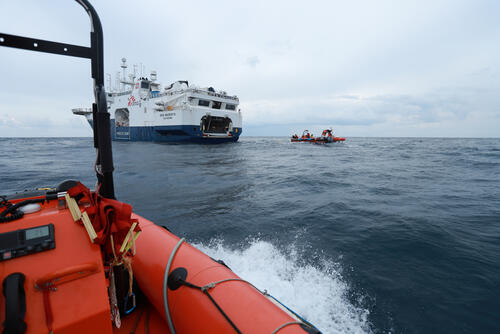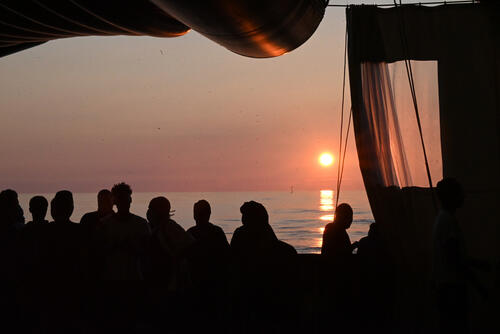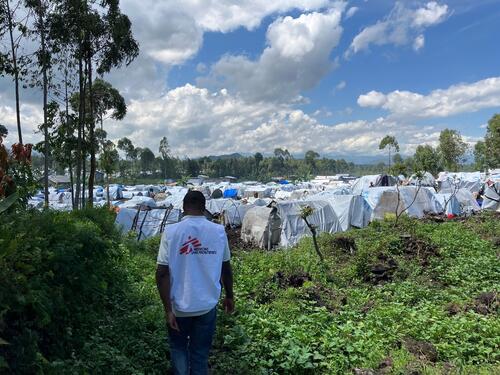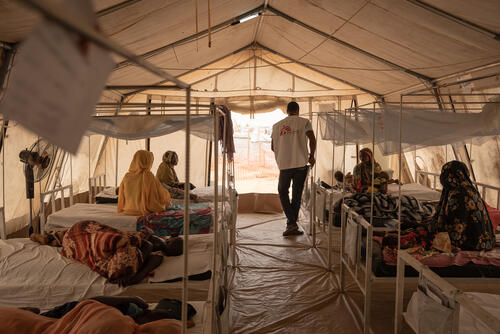- The MSF-operated search and rescue ship, Geo Barents, has been detained by Italian authorities in port.
- A court appeal has been lodged against the detention of the Geo Barents.
- MSF urges the Italian government to annul the law under which the Geo Barents is detained, and for the European Commission to scrutinise this law.
Rome, Italy – An appeal has been lodged at the competent court against the detention of the search and rescue ship Geo Barents. On 23 February, the Ancona coastguard in Italy notified the Geo Barents of the 20-day detention, and a fine of up to €10,000, for failing to provide the voyage data recorder to authorities on arrival at Ancona on 17 February to disembark people rescued at sea.
A voyage data recorder (VDR) is similar to the flight data recorder, or ‘black box’, of an aircraft. The authorities’ request to save and share this data is completely inconsistent with usual practice. In the eight years in which MSF has been engaged in search and rescue activities in the central Mediterranean Sea, we have never been asked to provide VDR data. As stated in the relevant maritime conventions and guidelines, the purpose of the VDR is to make the data available in case of maritime incident investigations. Since no such incident occurred on board Geo Barents, no data was specifically saved or downloaded.
“Geo Barents operates at all times in compliance with the applicable regulations and has collaborated in absolute good faith with the authorities by providing all available data related to rescue operations, in fulfilment of its duties under international law,” says Juan Matias Gil, MSF search and rescue representative. “We consider this sanction, based on the request for VDR data, out of the scope of maritime law and hence an illegitimate act to obstruct civilian efforts to save lives at sea.”

The detention of Geo Barents is a direct consequence of the enforcement of Italy’s Decree Law 1/2023, just converted into Law 15/2023, which creates a series of bureaucratic burdens on search and rescue operations. It is the latest example of the Italian government deploying its administrative powers to punish organisations involved in search and rescue activities, and to obstruct civilian efforts to rescue people in distress at sea. Since 2017, MSF and other non-governmental organisations have faced frequent harassment by the authorities, including prolonged inspections and detainment, with the aim of preventing their lifesaving activities at sea.
“The detention of Geo Barents is taking place against the backdrop of virtually no state-led search and rescue capacity in the central Mediterranean,” says Virginia Mielgo González, MSF project coordinator on board the Geo Barents. “States such as Malta and Italy consistently delay – or in some cases fail to provide – assistance to boats in distress in their own search and rescue regions.”
“Since the start of 2023, almost 10 people a day have lost their lives or have gone missing on the sea migration route between Libya and Italy,” says Mielgo González. “The latest measures by the Italian authorities directly target Geo Barents, but the real price will be paid by those fleeing across the central Mediterranean, who will be left without assistance.”
MSF reiterates our call to the Italian Government to annul Law 15/2023 and to stop criminalising humanitarian assistance for migrants and refugees. We call on the European Commission, as guardian of the treaties, to urgently put the Law under scrutiny and to carry out an in-depth review of the broadly documented criminalisation of search and rescue activities in Italy.
MSF calls on the EU member states, and on coastal states in particular, to fulfil their legal obligation to coordinate and conduct rescues at sea and to establish a dedicated, proactive state-led European search and rescue mechanism.
MSF has been running search and rescue activities in the central Mediterranean since 2015, working on eight different search and rescue vessels, alone or in partnership with other NGOs. Since 2015, MSF teams have provided lifesaving assistance to more than 85,000 people in distress at sea. MSF relaunched search and rescue activities in the central Mediterranean in May 2021, chartering its own ship, Geo Barents, to rescue people in distress, to provide emergency medical care to rescued people, and to amplify the voices of survivors of the world’s deadliest sea crossing. Since May 2021, the MSF team on board Geo Barents has rescued 6,194 people, recovered the bodies of 11 people and assisted in the delivery of one baby.






